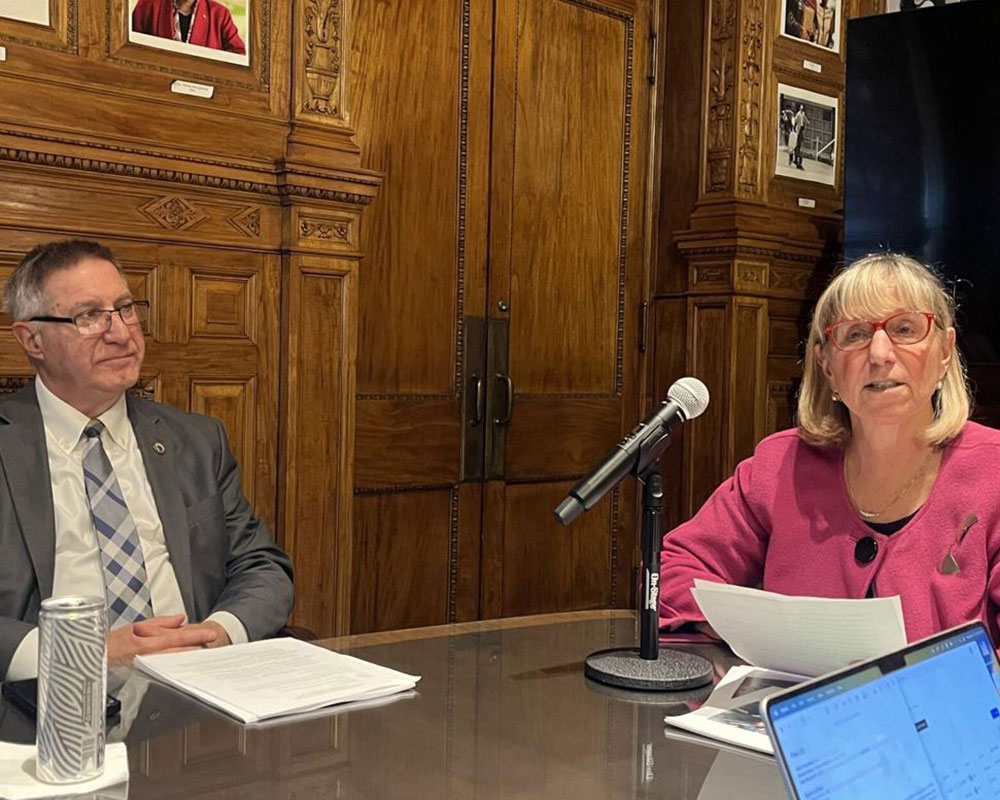The idea of free community college for everyone is coming back to Beacon Hill as the state Senate begins preparing its budget wish list.
Senate President Karen E. Spilka said Wednesday. “Keep your eyes peeled,” for free community college funding in the Senate’s version of the budget that begins next July 1.
Making community college free for every Massachusetts resident could cost the state about $170 million annually, according to a new report by Boston Consulting Group on behalf of the Massachusetts Association of Community Colleges. The report was rolled out to reporters Wednesday alongside Spilka, Senate Ways and Means Chairman Michael Rodrigues and Higher Education Committee Chair Sen. Jo Comerford.
The Senate president has said she hopes to make the state’s 15 community colleges free for all by the fall of 2024, but her goal may be affected by the state’s changing fiscal environment. The fiscal year 2024 state budget already deployed $20 million to cover any unmet community college costs for students 25 and older without a college degree.
Gov. Maura Healey earlier this week said she was making budget cuts after six consecutive months of tax collections coming in below projections. Budget writers will also have less wiggle room in their next budget, after lawmakers and administration officials estimated the state would bring in less general revenue in fiscal 2025 than they had originally built the fiscal 2024 budget on.
Asked if the announcement of budget cuts and disappointing revenues would undermine Spilka’s plan, she replied, “Those of us who have been in the State House a long time, you realize all revenue is cyclical.”
“There are some times where it’s up and then sometimes when it’s down,” the former Ways and Means Committee chairwoman continued. “We believe that, again, this is affordable. And we believe that this is a way to grow our state revenue to not only afford this, but many other programs and services that our residents want and deserve.”
The report suggests the program could be paid through revenue from the 4% surtax on household income above $1 million, which voters passed in 2022 with revenue to be used exclusively for education and transportation initiatives.
The state spent $1 billion of that new funding this year, about half of which went to education programs. They’re anticipating spending $1.3 billion from the surtax in fiscal 2025—meaning the free community college initiative could take up about 26% of newly-available education dollars, if budget writers decide to split the fund about evenly between education and transportation spending again.
Spilka, Comerford and community college presidents at Wednesday’s press conference said universal free community college would help address the state’s workforce shortage, lift up low-income families and help young people get on their feet without the pressure of student debt.
It was a similar argument that was made for Healey’s MassReconnect program, which this year made community college free for everyone older than 25 who did not previously have a college degree. That program cost the state $20 million in fiscal 2024, covering last-dollar costs that were not already paid for by federal or state financial aid.
Lawmakers and Healey also financed a new program in fiscal 2024 for free tuition for nursing students at community colleges across the state, amidst health care workforce shortages that have significantly impacted the industry and access to care.
The Boston Consulting Group report compares financing models that lawmakers could consider to pay for free community college. The group suggest a “preferred” model, which would provide more funding for low-income students than a “last-dollar” model like MassReconnect. Another more extreme model would also cover living expenses for low-income students, and would cost the state $280 million.
“It’s my responsibility to ensure that whatever we do is both affordable and sustainable for the future. The last thing any of us want to do is to start a program and then have to backtrack on it in a few years,” Rodrigues said. “Budgets are all about priorities. And it is our priority to ensure that every citizen in the commonwealth of Massachusetts has the opportunity for free community college. It is affordable; it will be sustainable.”
Sam Drysdale.

